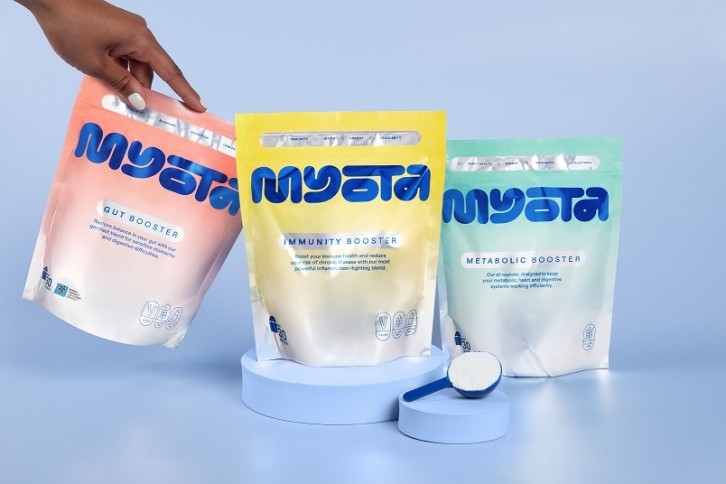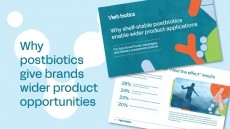Myota: Meeting the market gap for targeted prebiotics

Dr Caitlin Hall, chief dietitian and head of clinical research at Myota, says that the company was the first to start exploring prebiotics over probiotics in the UK with their extensive preclinical research.
She explains the importance of prebiotics: “What we’re now understanding is that probiotics are relatively limited in what they can do. There’s definitely a place for them, but how we describe it to our consumers is that our microbiome is like a zoo and the animals are the probiotics. All the different animals need to be fed different diets, but if you keep adding more animals you still need to feed everything already there.
“That’s where prebiotics come into it… there’s no point looking down the probiotic route unless you’re feeding the existing ecosystem that lives there. I think that is the major gap in the microbiome space at the moment,” she stresses.
Priority for personalisation
Hall emphasises the company’s recognition of the strong individual variability of microbiome compositions, and the resultant varying abilities to produce SCFAs.
“This is important as specifically the SCFA butyrate has been linked to anti-inflammatory effects in the gut, as well as further beneficial effects throughout the body in terms of insulin sensitivity, cholesterol levels, and brain health.
“But the way that prebiotics are used in clinical trials at the moment is problematic because they only use one single type of fibre supplement, whether that's inulin, fructo-oligosaccharides (FOS), galacto-oligosaccharides (GOS), or resistant starch. But what we know is if an individual doesn't have the gut bacteria to specifically break down and ferment that single ingredient, they won’t respond to treatment,” she explains.
She says that Myota’s initial research gathered hundreds of types of fibres and tested intakes on different microbiomes, analysing stool samples to observe SCFA production variability.
“Our ingredients are selected based on the prebiotic fibres with the greatest potential to product SCFAs in the most amount of people,” she explains.
She highlights the key barriers to hyper-personalisation of biotics, as previously discussed in a panel covered at NutraIngredients, yet explains that Myota’s fibre range still enables for 90% of the population to be reached.
Product portfolio
Myota’s five-strong product range includes ‘Immunity Booster’, with resistance starch, FOS, inulin, partially hydrolysed guar gum (PHGG) and guar gum, and ‘Metabolic Booster’ which contains additional non-fermentable fibres, such as oat and wheat, for their benefits to blood sugar and cholesterol levels.
She says the brand’s ‘Gut Booster’ product contains low FODMAP fibres, good for consumers with gut conditions such as IBS and are highly sensitive to commonly included high FODMAP fibres such as inulin, FOS, and GOS, due to their rapid fermentability in the large colon resulting in additional bloating and diarrhoea.
She stresses: “We wanted to create a product that can still have the benefits to the microbiome for these people, as they also often have a really low gut diversity due to following the low FODMAP diet long-term. So we were trying to find fibres that are slowly fermented through the GI tract, and provide gentle fibres like oat fibre to help normalise bowel movements as well.”
‘Gut Booster’ has become their best seller, highlighting the demand for such products.
“We went through the whole Monash FODMAP certification process, so that one serving a day of the ‘gut booster’ is considered low FODMAP but is also helping to restore that microbiome diversity.”
Gut testing and consumer education
Hall says the biggest challenge at Myota is consumer education, explaining: “There’s definitely a want and a need for prebiotics, as our consumers are all looking for natural alternatives beyond medications and generic supplements to support their health conditions and symptoms.
“They’re beginning to learn that the gut microbiome is this highly modifiable system that has huge potential to influence all aspects of their health. But understanding the difference between pre- and probiotics is a completely different story. It’s still very new to the consumer in terms of what role each biotic plays and what’s best for them in different situations,” she adds.
She emphasises the role of Myota’s microbiome testing kit in assisting with this understanding, particularly for those without physical symptoms.
“So for those who don’t get that immediate feedback and relief from a prebiotic, the diagnostic kit is incredibly beneficial for them.
“They can see how the prebiotic is working by seeing where they were at the start of their journey, and how their microbiome has changed after say three months of taking Myota. The hard data then reinforces that our product works, without seeing changes in symptoms if they don’t have them,” she asserts.
Looking to the future, Dr Hall explains Myota’s current research is exploring the gut-brain axis following strong preclinical research, investigating the potential for their fibre blend to influence stress, anxiety, and mood.
The brand is also set to launch a new prebiotic snacking bar range in the coming weeks, containing a dose of Myota’s original fibre blend in a range of flavours.











